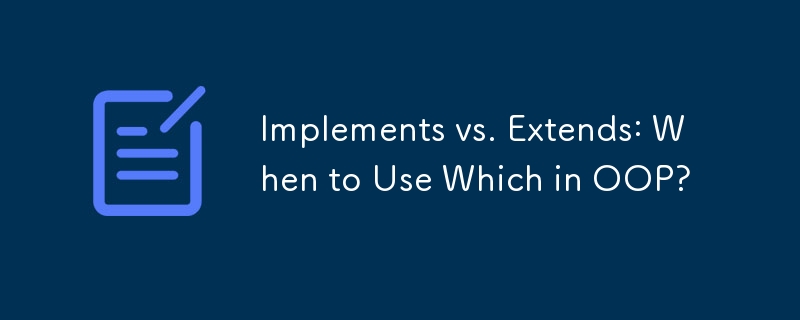
When to Use "Implements" vs "Extends" in Object-Oriented Programming
In object-oriented programming, understanding the difference between "implements" and "extends" is crucial. While both keywords allow classes to inherit functionality, they have distinct purposes.
Implements Interface vs Extends Class
-
Implements Interface: Used when a class agrees to provide implementations for methods declared in an interface. Interfaces define contracts that classes must fulfill by implementing the specified methods.
-
Extends Class: Used when a class inherits the properties and methods of a parent class. It allows the subclass to reuse and extend the functionality of the parent class.
Key Differences
-
Inheritance: Extends establishes a parent-child relationship, allowing the subclass to access the methods and variables defined in the parent class. Implements, on the other hand, does not provide direct inheritance.
-
Multiple Implementation: Interfaces support multiple inheritance in Java, allowing a class to implement multiple interfaces. Classes, however, only support single inheritance.
-
Overriding vs Implementing: When implementing an interface, the class must provide implementations for all declared methods. When extending a class, the subclass can optionally override parent class methods to modify their behavior.
When to Use
-
Implements: Use when you want a class to fulfill a specific contract defined by an interface, particularly if multiple inheritance is required.
-
Extends: Use when you want to extend the functionality of an existing class and reuse its methods and variables.
Examples
-
Implements:
public interface Drawable {
void draw();
}
public class Circle implements Drawable {
@Override
public void draw() {
// Implement the circle drawing logic
}
}Copy after login
-
Extends:
public class Base {
private int value;
public int getValue() {
return value;
}
}
public class Child extends Base {
private String name;
public String getName() {
return name;
}
}Copy after login
Understanding the nuances between "implements" and "extends" is essential for designing effective and maintainable Java code.
The above is the detailed content of Implements vs. Extends: When to Use Which in OOP?. For more information, please follow other related articles on the PHP Chinese website!






